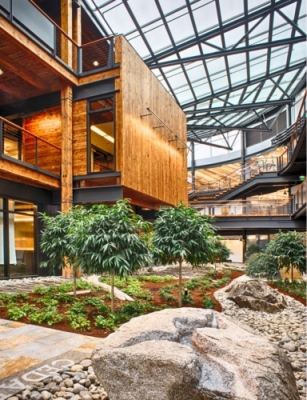Nov 27 2012
The Seattle District of the U.S. Army Corps of Engineers moves into new headquarters at Federal Center South Building 1202 today, a design-build project led by ZGF Architects LLP and Sellen Construction.
 Exposed salvaged structural timber is used throughout the central atrium "Commons." More than 200,000 board feet of reclaimed timber and 100,000 SF of decking were reclaimed from a decommissioned warehouse on the site. The sky lit Commons and connecting bridges incorporate biophilic design strategies. Elements of nature including plantings and a water feature provide a strong connection to the outdoors. Environmental amenities including daylight, views and fresh air are leveraged to enhance user health and productivity.
Exposed salvaged structural timber is used throughout the central atrium "Commons." More than 200,000 board feet of reclaimed timber and 100,000 SF of decking were reclaimed from a decommissioned warehouse on the site. The sky lit Commons and connecting bridges incorporate biophilic design strategies. Elements of nature including plantings and a water feature provide a strong connection to the outdoors. Environmental amenities including daylight, views and fresh air are leveraged to enhance user health and productivity.
The 209,000 square foot, high-performance building transforms an industrial brownfield warehouse site into a 21st century workplace and sets a new standard for the marketplace.
The $72 million project, funded by 2009 American Recovery and Reinvestment Act funding, is part of the U.S. General Services Administration's Design Excellence program to promote sustainability, help communities and advance a clean energy economy. GSA aimed to develop a state-of-the-art office building that meets the current and future needs of the Army Corps and its Seattle workforce. It is expected to merit LEED Platinum certification from the U.S. Green Building Council and an ENERGY STAR score of 100.
"This is the way buildings should be built if we are going to conserve energy and deal with climate change," remarked U.S. Representative Jim McDermott at a recent dedication ceremony. "With its innovative water capture and energy efficiency, the new district headquarters is a model for sustainable buildings."
The 1202 building is anticipated to be the region's most energy-efficient air conditioned building – using one fifth of the estimated energy for a standard office building in the Northwest. It uses an innovative "Phase Change Material" that releases and stores cold-energy to reduce the building's cooling needs, and it is one of the first in the region to combine the use of geothermal heating and cooling systems with structural piles.
Sustainable features include:
- 25,000 gallon cistern stores rainwater from the rooftop for use in toilet flushing, irrigation, etc.
- 90% of the building is naturally daylit through optimization of floor depth and facade
- 100% outside air is filtered and distributed via underfloor ventilation
- 300,000 board feet of reclaimed timber is used from an existing warehouse on site
- 50% reduction of impervious surfaces, creating 4.5 acres of pervious landscape
"We now have the right physical space to maximize our contribution as the nation's engineer. Throughout our history, innovation and sustainability have been Seattle District hallmarks. The flexibility, collaboration, and transparency of this building's physical layout provide the ideal environment to build on that legacy," said U.S. Army Corps of Engineers District Commander Colonel Bruce Estok.
The distinctive U-shape of the building configured around a central atrium introduces biophilic design principles such as daylight, views, natural forms and elements into the workplace to enhance employee health and productivity.
"The Oxbow configuration pays tribute to the historic course of the Duwamish Waterway and honors the Corps' mission of 'Building Strong,'" said Allyn Stellmacher, ZGF Architects LLP Design Partner. "It allows light to penetrate deep into the core where the office floor plates wrap around a central atrium with shared conference rooms and building amenities that encourage interaction and collaboration."